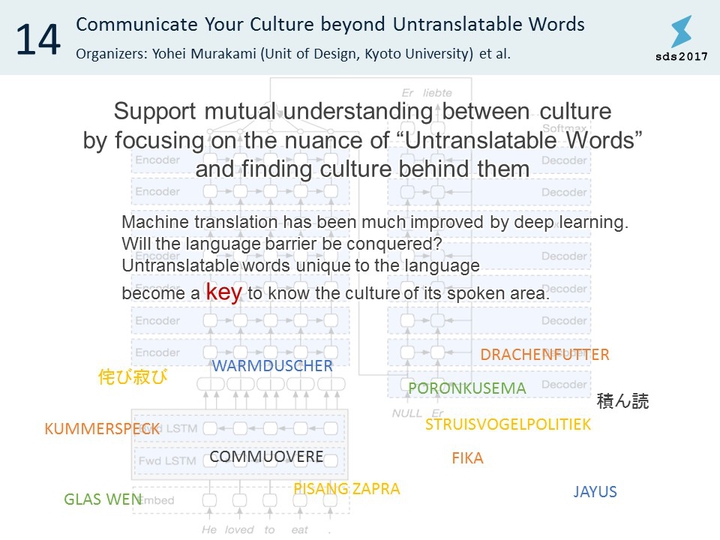English would be useful if you seek the efficiency of multilingual communication. However, languages have many words to represent culture and customs cultivated in their spoken area. Let’s think about a way to communicate your culture beyond untranslatable words.
We call for participants who speak or love dialects and foreign languages.
We welcome all area of specializations.
注)このテーマは英語で実施されます。英語でのディスカッションが可能な方のみご参加いただけます。
| Name | Organization | Specialty |
|---|---|---|
| Yohei Murakami | Unit of Design,Kyoto University | Services Computing,Intercultural Collaboration |
| Toru Ishida | Department ofSocial Informatics,Kyoto University | Artificial Intelligence,InterculturalCollaboration |
| Donghui Lin | Department ofSocial Informatics,Kyoto University | Services Computing,InterculturalCollaboration |
| Arbi Haza Nasution | Department ofSocial Informatics,Kyoto University | Artificial Intelligence,InterculturalCollaboration |
| Takao Nakaguchi | The Kyoto College of Graduate Studies for Informatics | Services Computing,Intercultural Collaboration |
The quality of machine translations has been much improved by deep learning technologies. A machine translation provided by Google last November had a great impact on the world. It supported 8 language pairs (English-French, English-German, English-Spanish, English-Portuguese, English-Chinese, English-Japanese, English-Korean, English-Turkish) at that time and 3 more language pairs (English-Russian, English-Hindi, English-Viet) this March, which covers one third of world population. It is said that the quality of machine translations will be further improved by repeatedly learning data.
So, will the language barrier be conquered, and smooth multilingual communication be realized? For example, the German language has a word of “Kummerspeck.” The literal translation of this word is “grief bacon,” which does not have the original meaning that someone gets fat by overeating due to sorrowfulness. Moreover, this word consists of “Speck”, which means a bacon less popular in Germany and fatter than a sausage. This might give us an impression of guilty feeling.
Such an untranslatable word reflects culture and customs in its spoken area, and is assigned to a unique concept the other languages do not have. In this workshop, we will propose a framework for mutual understanding between different culture by focusing on the nuance of untranslatable words and finding culture behind them.
This workshop also aims at prototyping even a part of created ideas. For prototyping, we plan to use multilingual service infrastructure called “The Language Grid” and IoT devices.
Participants will learn how to understand different culture by recognizing an originality of first languages they usually use and nuances of untranslatable words.
Organizers give a lecture about problems occurring in machine-translation mediated multilingual communication.
[Design Method]Participants learn design methods through practices by referring to 101 Design Methods (WILEY, 2013), such as brainstorming, semi-structured interview, and so on.
- Explain a main purpose of this theme
- List up untranslatable words in participants’ first languages
- Classify nuances of the untranslatable words and make a list of questions for interviewing with a translator
- Interview with a translator or interpreter to learn his/her field experiences and techniques
- Structure insights and issues obtained from the interview
- Explain the ten-year long Language Grid Project led by organizers and available tools using the Language Grid
- Create ideas to communicate untranslatable words
- Concretize the ideas by making a story board
- Prototype even a part of the ideas using the Language Grid, with the cooperation of faculties who are implementing the Language Grid
- Make a plan for final presentation
- Preparation (KRP)
- Presentation (KRP)
